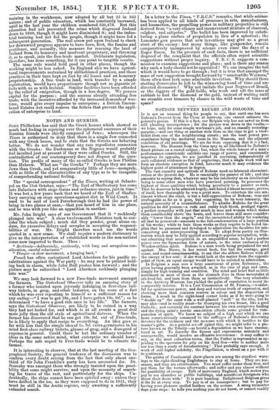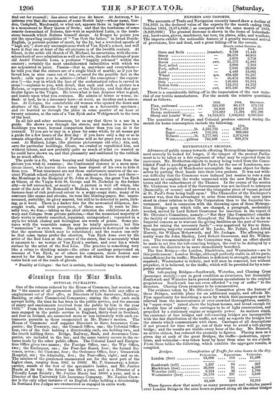NOTIONS BETWEEN BRUGES AND COLOGNE.
IT is not an unusual thing for people to say, that until one has seen Rubens's Descent from the Cross at Antwerp, one cannot estimate the painter's genius. If this is a fact, our Belgian trip has not saved us from still pleading incompetence ; for the picture was down in the vaults,— we hope, only for some simple workman's job, and no rascally restoring- purpose,—and one thing or another stole from us the time to get a view- ticket from one of the neighbouring streets ; not the least potent pro- crastinator being the mediaeval room in the Museum, and the adjacent exhibition of old paintings. We are far from supposing that it is a foot, however. The Descent from the Cross may in all likelihood be Rubens's finest picture on a sacred subject ; but, when the whole tenour of a man's performances consistently exhibits one range of power, and consistently negatives its opposite, we are justified in assuming, independently of such collateral evidence as that of engravings, that a single work will not form an absolute exception in kind, however much it may evidence the highest point of attainment in degree.
The vast capacity and aptitude of Rubens need no laboured characteri- zation at the present day. He is essentially the painter of life ; and this amounts to saying that, whatever may be his inferiority as an intellectual being to some other men who have practised painting, he possesses the highest of those qualities which belong peculiarly to a painter as such. That he deserves to be admired hugely, and hated without measure, proves, of itself, how thoroughly he was a great man. To entertain the one sen- timent without the other, is but a half-appreciation of Rubens; true and irrefragable as far as it goes, but suggesting, by its very intensity, the natural necessity of a counterbalance. To admire, Rubens for the great qualities he did possess—a rude and ruddy high blood, prodigal vigour, a perfect sympathy with just that much in man and woman which makes them considerably above the brute, and leaves them still more consider- ably " lower than the angels," and the unrestricted ability for rendering all that he perceived—amounts to the full condemnation of a large portion of his works ; while to hate those works as they require to be hated im- plies that he possessed and developed to admiration the faculties for mis- conceiving and misrepresenting them. To adopt from poetry an illus- tration which may be fully applied according to popular acceptation, with- out admitting that acceptation in an unqualified sense, he had a perfect power over the Spensermn form of nature, to the utter exclusion of its Wordsworthian spirit. Rubens is a man worth being prejudiced for and against. Mrs. Stowe, in her recent book, has had the courage, good sense, and sound connoisseurship, to say that she abhors Rubens with all the energy of her soul : if she would look at the matter from the opposite point of view, an equal energy would have to be enlisted in admiration. In Belgium a man sees a large assortment of prize Rubenses ; the prize having generally been awarded, as in the case of pigs and oxen, simply for high training and condition. The mind and heart find as little nutriment in most of them as the stomach does in those mountains of art-bred fat, and turn from them as instinctively. One very admirable in the Antwerp Museum has yielded the palm of reputation to many in- comparably inferior. It is a Last Communion of St. Francis,—wonder- ful for spontaneous power, and deep and various truth of expression, and showing more than common reserve in colour and the disposition of forms. A monk in the right-hand corner looks as if be were going to "double up" the saint with a well-planted "mill" in the ribs, but he may also—and in reality must—be thumping his own breast, like a good Catholic ; and certainly the contrast between his own overgrown feeding and the dying saint's ascetic emaciation affords some ground for com- punction of spirit. We know no subject of a high cast which we can more conscientiously commend to the suffrages of Rubens's discerning devotees for the richness and the measure with which it testifies to the master's gifts. As a painful set-off aginst this, we might refer to a pic- ture known as the Trinity—as horrid a degradation as we have encoun- tered in art. To describe the figures and expressions minutely and unreservedly, would involve en offensive irreverence: it may suffice to say, in the most colourless terms, that the Father is represented as ap- pealing to the spectator for pity on his dead Son—who is neither more nor less than a study of foreshortening ! That probably says enough. A work of still higher celebrity, the Flagellation, is about on a par with it in sentiment.
The guides of Continental show-places are among the sturdiest warn-
ings to the right-thinking Englishman to stay at home. They arc nui- sances, and they are extortionists. You must suffer under them first, and pay them for the torture afterwards; and suffer and pay almost without the possibility of escape. Talk of mercenary England, which makes you pay to see churches or public buildings, and munificent foreigners who throw their doors wide! It is pure humbug. Enlightened Belgium gives it the lie at every step. To pay is of no consequence ; but to pay for having your pleasure spoiled borders on the serious. A smug tormentor dogs your steps : he tells you nothing you do not know, or cannot readily
find out for yourself; lies about what you do' know. At Antwerp,• he informs you that the monument of some Scotch lady-whose name, Gor- don, Campbell, Macdonald, or what not, appears there in legible brass- is a monument to Mary Queen of Scots ; and that the tombstone of some remote descendant of Rubens, fair-writ in sepulchral Latin, is the tomb- stone beneath which Rubens himself sleeps. At Bruges he points you out the sprawling insipidities of " Van Oost the father," in broad Dutch- English, (a portrait-painter of merit, by the by, but a wretched apostle of "high art,") slurs any unconspicuous work of Van Eyck's school, and will have it that one at least of the oil-pictures is of the twelfth century. At Ghent, in the noble old church of St. Michael, he uncurtains, with the con- scious hush of your admiration as well as his own, the anile daubings of poor old Andre Corneille Lens, a professor " happily released" within the century; certainly the most unadulterated imbecilities with which we are acquainted in paint. Passim-that is, anywhere and everywhere- he tells you that the statues are of a single block of marble, as if you be- lieved him in nine cases out of ten, or cared for the possible fact in the tenth ; calls upon you to admire-(what? the conception ? the expres- sion ?)-the way in which the lace of the ecclesiastical robes is carved in stone !-explains to you, with detail, that such and such a picture is a Rubens, or represents the Crucifixion, or the Nativity, and that that par- ticular figure is the Virgin. He loves what is bad, despises what is good, and insists upon what you contemn. He admits of better or worse, in- deed : at best, he is a necessary bore-at worst, an incubus and a succu- bus. At Cologne, the comfortable old woman who opened the doors and shutters of the Museum for us may rank as a favourable specimen ; and she hurried us through the place in some quarter of an hour or twenty minutes, at the rate of a Van Eyck and a Wohlgemuth to the turn of the heel.
In all fair and sober seriousness, let us say that there is a use in a guide. He shows you through the streets, and makes you know the buildings you want, beyond comparison faster than you can do it for yourself. If you are to stay in a place for some while, by all means get a guide for a few hours of the first day : if you have only a day or so to remain altogether, avoid him, if Fortune will so far grace you as to suc- ceed. At Malines, Liege, (the glorious picturesque old city,) Aix, and, save for particular buildings, Ghent, we evaded or repudiated him, not without labour, and saw probably quite as much of what we wanted as he could have shown us, and that pleasantly and undiluted by the rubbish he so much affects.
The guide is a fly, whose buzzing and tickling disturb you from the picture you wish to examine ; the Continental restorer is a more mon- strous insect, who leaves there some base deposit of his own to hide it from you. What treatment are not those unfortunate masters of the an- cient Flemish school subjected to ! An eminent work here and there- the Memlings in the Hospital of St. John at Bruges, the great Van Eyck at Ghent, or the Virgin with St. George and St. Nicholas in the former city-is left untouched, or nearly so. A picture is well off when, like most of the Acts of St. Romuald at Malines, it is merely reduced from a furnace-heat of rich profound colour to a soppy-soapy state, many of its contours like seams and streaks, its tone like blotting-paper, flat, unpro- nounced, puttylike, its glory marred, but still to be detected in parts, lurk- ing, as it were. There is a darker fate for the unwearied diligence, far- sought truth, and vital perception, of these men. It must be lite- rally true, we fear,-taking as the chief criterion the exhibitions at Ant- werp and Cologne from private galleries,-that the numerical majority of their works is utterly cancelled, repainted, extinguished ; repainted in a style for which clumsy and feelingless are words of praise. Some pic- tures with the venerable names may be totally spurious ; but this "restoration" is even worse. The genuine picture is destroyed in order that the spurious blotch may be substituted ; and the reason can only be that some tastes prefer the abortion. Van Eyck done over by the artist of the Red Lion at the corner of the street, that is accurately what it amounts to : no vestige of Van Eyck's surface, and over his a whole surface by the artist of the Red Lion. The practice is something very like a crime to thinking minds-the crime of sacrilege perpetrated on remains of Van Eyck, or of others his compeers, more human and sacred by far than the poor bones and flesh which have decayed cen- turies back out of the reach of ghouls.
• Possibly at Cologne : the fact is certain, the locality may be misstated.



































 Previous page
Previous page